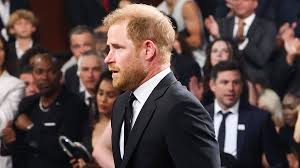Prince Harry, the Duke of Sussex, has been raising eyebrows with his evolving accent that seems to be veering more towards Americanisms. The journey of his accent transformation can be traced back to 2018 when he first displayed subtle changes in pronunciation during his public introduction of his son, Archie. The prince adorably noted Archie's 'LIDDLE bit of facial hair,' pronouncing 'little' in a way that hinted at a departure from his traditional English accent.
The shift became more evident with the release of his autobiography, 'Spare,' in early 2023, where American colloquialisms like 'good weed,' 'dude,' 'yeah,' and 'kinda' surfaced within its pages. While the book was co-written with American author J.R. Moehringer, the influence of American expressions began permeating Harry's spoken language around the same time. He started using terms like 'awesome,' 'dude' cpronounced as 'dood'c, and 'you guys,' while pronouncing 'arse' in the American manner, as 'ass.'
Interestingly, Harry seems to be following in the linguistic footsteps of his great-great uncle, the Duke of Windsor, who notably adopted American inflections after marrying an American and living in exile. The Duke's accent notably mirrored American pronunciations, such as saying 'prog' in 'progress' to rhyme with 'frog' and pronouncing 'new' as 'noo.'
Contrastingly, Queen Elizabeth II, Harry's grandmother, exemplifies how accents within the royal family have evolved over time. The Queen's accent, characterized by a formal British tone in her younger years, gradually shifted to a more relaxed and less grandiose delivery as she aged. Themes of duty and tradition factor into these shifts, as noted by her voice coach, influencing the subtle changes in pronunciation and intonation over the decades.
Notably, Prince Harry's journey in navigating his accent reflects the broader trend of language evolution amongst royals, with each generation adapting and molding their accents to contemporary norms. The exploration of how Harry's accent continues to transform provides a fascinating window into the ever-changing landscape of linguistic expression within the royal family.
In conclusion, the intricate interplay of personal experiences, relationships, and cultural influences contributes to the dynamic evolution of accents within the royal family. Prince Harry's ongoing shift towards American expressions showcases how language can serve as a reflection of one's experiences and connections, highlighting the interconnected nature of identity and communication. With each spoken word, the nuances of accent reveal a deeper narrative of adaptation and evolution for individuals navigating the complexities of tradition and modernity.

